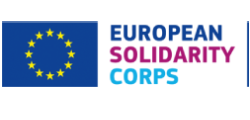Solidarity Projects
If you want to make a positive change in your local community, then you can join forces with your friends to create a Solidarity Project. Just make sure all of you are registered in the European Solidarity Corps portal.
What's a Solidarity Project?
- It should be devoted to challenges and causes that matter to you starting from your neighbourhood, or help tackle regional or even national issues;
- It should demonstrate ‘European value’ – drawing on priorities identified by the EU, such as inclusion, climate change, democratic engagement, citizenship or gender equality;
- It can last between 2 and 12 months;
- It's mainly done in part-time, so you can do it in your free time.
Who can take part?
- 18-30 year old people who reside in one of the EU countries, Iceland, Liechtenstein, North Macedonia or Türkiye.
- The group must have at least 5 people who reside in the same country (there’s no maximum number of people).
What financial support do I get?
- 630€ a month to cover the cost of managing and implementing the project.
- Costs linked to the involvement of a coach in the project will also be covered, if one is needed.
- You can also apply for additional funding to cover costs to support participation of young people with fewer opportunities (exact needs must already be detailed in the application form).
How to apply?
For Solidarity Projects you need to request direct funding for your project (unlike Volunteering activities for which you apply to organisations).
To do so, you must apply to the National Agency of the country where you are residing, submitting your project’s proposal before the deadline set in the call for projects. You can apply yourself or work with an experienced organisation on who will apply in your behalf.
In the application form, you will be asked questions such as why you want to carry out this project, how it will benefit the community, and which activities you are planning to run.
Your application will be then assessed by your National Agency.
Before you apply:
- Create your group – reach out to other young people in your community and form a group with a common idea or topic.
- Get everyone registered – all members of the group must join the European Solidarity Corps.
- Get an organisation ID (OID) – one member of the group needs to take the role of ‘group leader’ and register for an OID, by creating an account with the European Commission. If an organisation is applying on your behalf, maybe they are already registered and have an OID (if not, they will need to obtain one). As soon as you’re registered and waiting for your OID to be approved, you can continue with the next steps.
- Do your homework – read:
- the information about Solidarity Projects in the European Solidarity Corps guide;
- the relevant pages on your National Agency website (you can even reach out your National Agency for help with your application);
- this sample application form
- Create your project – structure your ideas (goals, group members, expected outcomes, budget, activities, etc.).
- Submit your application – using the ESC30 Solidarity Projects application form. Don’t miss the deadline!
Please consult the Frequently Asked Questions (FAQs) for more details.
Registering for the Corps does not guarantee you’ll take part in a Solidarity Project.
